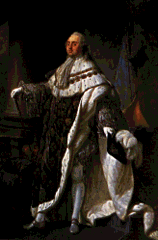
Influences
The storm broke during the reign of Louis XVI. Awkward and timid, no man appeared less like a king than Louis XVI. He was 20 years old when he
came to the throne. No one could have seemed more out of place than
he did. Louis realized this and often wished, even before the Revolution,
that he were only a common man. His greatest fault was that he was
always ready to listen to others and follow their advice. When this
advice was good, everything was fine; but later in Louis XVI's reign the
advice was bad and it cost the king his life.
man appeared less like a king than Louis XVI. He was 20 years old when he
came to the throne. No one could have seemed more out of place than
he did. Louis realized this and often wished, even before the Revolution,
that he were only a common man. His greatest fault was that he was
always ready to listen to others and follow their advice. When this
advice was good, everything was fine; but later in Louis XVI's reign the
advice was bad and it cost the king his life.

Contributions to the Revolution
Louis XVI became king of France in 1774. On his accession, France was poverty-stricken and burdened with debts, and heavy taxation had resulted in widespread misery among the French people. Immediately after he was crowned, Louis remitted some of the most oppressive taxes and instituted financial and judicial reforms. Calonne was appointed finance minister in 1783. He borrowed money form the court until 1786, when the borrowing limit was reached. The French people, angered by the taxes and the excessive spending of the court, recalled Necker, who, however, could not prevent bankruptcy of the government. With no other choice, Louis XVI was forced to call a meeting of the Estates-General in Versailles on May 5, 1789.
Condemnation to Death
At first the king seemed inclined to work with the revolution and to try to solve the problems. But the influence of the queen and of the courtiers were too strong. He was encouraged by them to disregard all promises he had made and sought to flee from France in order to obtain aid against the revolution from Austria. His disregard of his promises to abide by the constitution led to the storming of the royal palace of the Tuileries on Aug. 10, 1792. The king and his family escaped before the mob arrived and took refuge in the hall of the Legislative Assembly. The assembly declared that the king was suspended from office and ordered that he and his family should be imprisoned. They then called a new assembly, the Convention, to decide whether France should continue to be a monarchy.

The Convention brought Louis XVI to trial on the charge of conspiring with foreign countries for the invasion of France. He was declared guilty and was sentenced to death. His execution had important consequences for France, because it brought about ideas in other countries against the French Revolution.